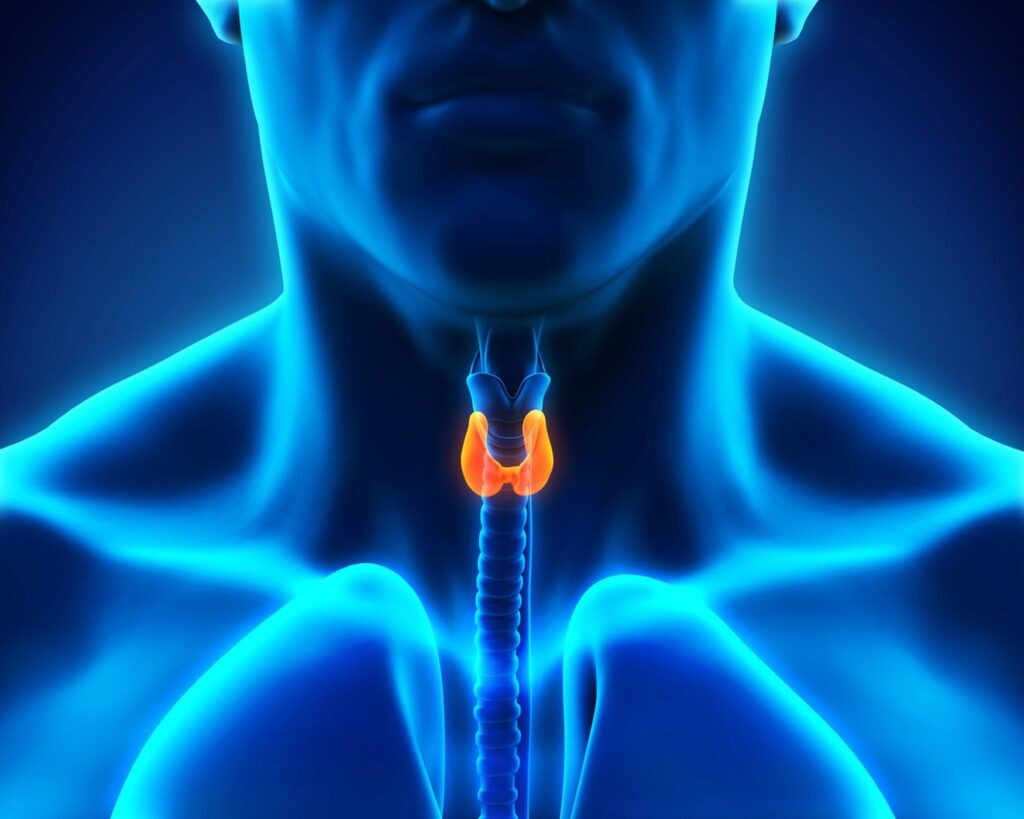- fei
- 0 Comments
The thyroid gland is located at the front of the neck just below the Adam’s apple also known as the larynx. It is tiny butterfly shaped gland and consists of two lobes located on either side of the trachea. The thyroid gland is small but plays a huge role in one’s health and well being.
The thyroid is part of the endocrine system, which is essentially a collection of glands. Glands produce hormones that regulate mood and various functions in the body. These hormones impact a host of vital body functions, including heart rate, skin maintenance, brain and nerve function, body temperature regulation, fertility, digestion and more.
The thyroid gland controls just about every cell in the human body. It secretes various hormones into the bloodstream. The hormones control the rate at which cells and organs turn nutrients into energy and the amount of oxygen cells use. In essence, the thyroid gland is the body’s master metabolic control center. So many vital functions are at the mercy of thyroid function.
The thyroid works in conjunction with the pituitary gland. The pituitary gland regulates how much hormones the thyroid releases. The release of thyroid hormones from the thyroid gland is controlled by hormones from the hypothalamus in the brain and by thyroid stimulating hormones produced by the pituitary gland. This messaging process is often referred to as the ‘feedback loop’. These 3 glands work as a team to keep the body’s homeostasis or ‘equilibrium’ by releasing just the right amount of circulating thyroid hormones in your body at any given time.
There are several health issues that can arise from the thyroid. Here are some of the most commonly diagnosed. Graves’ disease is an autoimmune disorder. The immune system attacks the thyroid gland and makes it become overactive. An overactive thyroid is a condition called hyperthyroidism . A bulge on the neck, called a ‘goiter’ is a common symptom. Hypothyroidism is the opposite of Graves’disease. It occurs when the thyroid gland does not produce enough hormones. This can cause body functions to slow down or stop completely. Hashimoto’s disease is another thyroid condition that triggers the immune system to attack the thyroid gland, sending the endocrine system into chaos. A thyroid function blood test can be performed in a doctor’s office to gauge overall thyroid health.
For the thyroid to remain healthy, it needs iodine to produce hormones, but just a little. Too much iodine can actually make the thyroid produce less hormones.
The best way to get iodine is through eating healthy foods, such as seafood and dairy products. You can also get it by seasoning your food with iodized salt. Fun fact: Iodine was first added to salt in the United States in the 1920’s to combat goiters.
The thyroid might be small, but oh, is it ever mighty!
More facts about the thyroid gland:
- More than 27 million Americans have some sort of thyroid disease. About half of these have no idea they suffer from a thyroid imbalance.
- Women are typically more prone to thyroid issues than men.
- Thyroid disease becomes more common as we age.
- Thyroid hormone production is controlled by the hypothalamus and pituitary gland (located in the brain). Communication with the brain maintains optimal balance in the body.
- Stress is a major factor that adversely affects the thyroid.
- Hypothyroidism is an underproduction of thyroid hormone. Symptoms include fatigue, sensitivity to cold, excess weight gain, poor circulation, dry skin, hair loss, depression, and poor digestion.
- The overproduction of thyroid hormone is called hyperthyroidism. It causes increases in metabolic rate, sensitivity to heat, restlessness and anxiety, goiters, and weight loss.
- Many thyroid abnormalities are seen during times of fluctuating reproductive hormones such as pregnancy and perimenopause.
- Important nutrients for the thyroid are iodine, tyrosine, B vitamins, vitamin A, selenium, zinc, and the essential fatty acids.
- The thyroid stores a lethal amount of hormones – so much that if the gland released all it all at once, it could kill you. Fortunately thyroid hormone is very tightly regulated by constant, exquisitely sensitive signals traveling between the brain, the gland, the body’s tissues, and the blood concentrations of the hormone at any given moment (Whew!).
